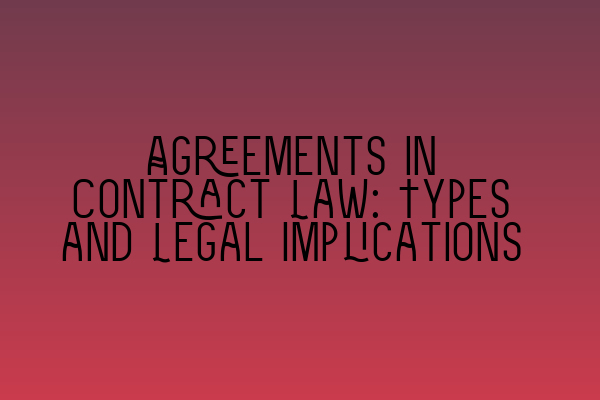Agreements in Contract Law: Types and Legal Implications
Contracts govern countless interactions and transactions in our daily lives. Whether you’re buying a car, starting a business, or even just signing a lease, you’re engaging in a contractual agreement. In contract law, agreements play a crucial role in defining the rights and obligations of the parties involved. Understanding the different types of agreements and their legal implications is essential for anyone involved in business or legal matters. In this article, we will explore various types of agreements in contract law and dive into their legal significance.
Express Agreements
In contract law, an express agreement is one in which the parties explicitly state the terms and conditions of their agreement, either orally or in writing. It is the most common form of agreement and provides clear evidence of the intent and understanding between the parties. Express agreements often involve detailed documentation, such as contracts, purchase orders, or written agreements.
Express agreements provide clarity and help prevent misunderstandings or disputes that may arise due to conflicting interpretations. For example, when purchasing a property, an express agreement will outline the price, conditions of the sale, and any other specific terms both the buyer and seller have agreed upon. This ensures that both parties are aware of their rights and obligations.
Implied Agreements
Implied agreements, on the other hand, are not explicitly stated by the parties involved. Instead, they are inferred based on the conduct, actions, or circumstances surrounding the agreement. These agreements are legally binding, even though they may not be formally documented.
An implied agreement can arise from the parties’ conduct or consistent behavior. For example, if you hire a taxi and ask the driver to take you to the airport, it is implied that you will pay the fare upon arrival. The agreement to pay for the service is not explicitly stated, but it is understood based on the circumstances and common practice.
Implied agreements can also be inferred from the relationship between the parties involved. For instance, when a doctor provides medical treatment to a patient, an implied agreement is formed that the patient will pay for the services rendered.
Executed Agreements
An executed agreement is one in which both parties have fulfilled their respective obligations. Once the terms of an executed agreement have been met, it is considered a completed contract. For example, if you hire a painter to paint your house and the painter has completed the job to your satisfaction, the agreement is considered executed.
Executed agreements are important because they provide certainty and closure. Once the terms have been fulfilled, neither party can demand further performance or alter the agreement without mutual consent, unless specified otherwise in the contract.
Executory Agreements
In contrast to executed agreements, executory agreements are those where one or both parties still have outstanding obligations to fulfill. These agreements are not yet completed and are referred to as “in progress.”
Executory agreements are common in ongoing business relationships and long-term contracts. For example, when a company enters into a contract with a supplier for the provision of raw materials over a period of two years, the agreement is executory until both parties have fulfilled their respective obligations at the end of the two-year period.
Unilateral Agreements
Unilateral agreements involve a promise made by one party in exchange for the performance of a specific act by the other party. In unilateral agreements, one party is obligated to fulfill their promise only if the other party performs the requested action.
A classic example of a unilateral agreement is a reward offer for the return of a lost item. If you lose your wallet and announce a reward for its return, anyone who finds the wallet and returns it is entitled to claim the reward. The person who finds the wallet is not obligated to return it, but by doing so, they create a valid contract and can expect to receive the promised reward.
Bilateral Agreements
Bilateral agreements are the most common type of agreement and involve mutual promises between two parties. In this type of agreement, both parties make promises and exchange something of value. Bilateral agreements create reciprocal obligations for each party involved.
For example, a contract for the sale of goods is a bilateral agreement. The buyer promises to pay the agreed-upon price, and the seller promises to deliver the goods as described. Both parties have obligations they must fulfill to complete the agreement, and a breach by either party can result in legal consequences.
Legal Implications of Agreements
Understanding the legal implications of different types of agreements is crucial for navigating contract law. Failure to comply with the terms of an agreement can lead to legal disputes, financial penalties, and damage to a party’s reputation.
It is advisable to seek legal guidance when entering into complex agreements, especially those involving substantial financial or legal consequences. A contract law solicitor can provide valuable advice and ensure that your interests are protected.
Moreover, staying up to date with the evolving laws and regulations surrounding agreements is essential. Websites like SQE Contract Law offer comprehensive resources to expand your knowledge and stay informed about contract law principles.
Conclusion
Agreements form the foundation of contract law, governing a wide range of interactions and transactions. Understanding the different types of agreements, such as express, implied, executed, executory, unilateral, and bilateral, is crucial for anyone involved in legal or business matters. By knowing the legal implications of these agreements, you can navigate contract law with confidence and protect your rights and obligations.
For further resources on contract law, make sure to check out these related articles:
